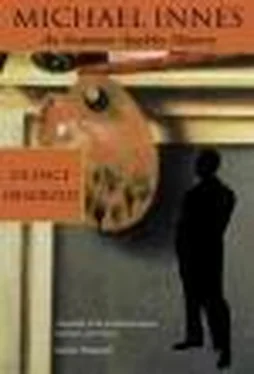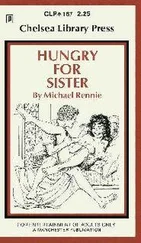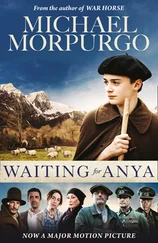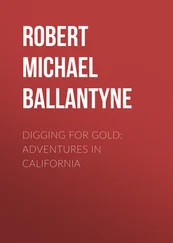Michael Innes - Lament for a Maker
Здесь есть возможность читать онлайн «Michael Innes - Lament for a Maker» весь текст электронной книги совершенно бесплатно (целиком полную версию без сокращений). В некоторых случаях можно слушать аудио, скачать через торрент в формате fb2 и присутствует краткое содержание. Жанр: Старинная литература, на английском языке. Описание произведения, (предисловие) а так же отзывы посетителей доступны на портале библиотеки ЛибКат.
- Название:Lament for a Maker
- Автор:
- Жанр:
- Год:неизвестен
- ISBN:нет данных
- Рейтинг книги:4 / 5. Голосов: 1
-
Избранное:Добавить в избранное
- Отзывы:
-
Ваша оценка:
- 80
- 1
- 2
- 3
- 4
- 5
Lament for a Maker: краткое содержание, описание и аннотация
Предлагаем к чтению аннотацию, описание, краткое содержание или предисловие (зависит от того, что написал сам автор книги «Lament for a Maker»). Если вы не нашли необходимую информацию о книге — напишите в комментариях, мы постараемся отыскать её.
Lament for a Maker — читать онлайн бесплатно полную книгу (весь текст) целиком
Ниже представлен текст книги, разбитый по страницам. Система сохранения места последней прочитанной страницы, позволяет с удобством читать онлайн бесплатно книгу «Lament for a Maker», без необходимости каждый раз заново искать на чём Вы остановились. Поставьте закладку, и сможете в любой момент перейти на страницу, на которой закончили чтение.
Интервал:
Закладка:
Diana, Mrs Hardcastle; Mrs Hardcastle, Miss Diana Sandys! Don’t mind staring, Diana – I think the old lady’s next to blind. And isn’t she a beauty? No doubt Hardcastle, who can’t be more than fifty, took her for the sake of her old-age pension – or perhaps she made a little fortune as the Bearded Lady in a circus. If these appear brutal remarks think of a fine gentlemanlike Renaissance poet having a good go at describing a witch; that will serve for the rest. Come to think of it, Laird Guthrie may very well be an enchanter and keep a witch or two on hand. I wouldn’t put it beyond him indeed. But I suspect Mrs Hardcastle has a kind heart: in a fumbling sort of way she made fires, brought really hot water, brought towels, even thought to bring soap – albeit of the kitchen variety – and a certain amount of bedding for my uninviting couch. And after that Guthrie said with a bow that we should meet for supper at nine.
We met – and at this point you meet Christine. I haven’t at all got Christine yet, but in her way she is as striking as Guthrie, who seems to be her uncle. Striking perhaps in a temporary fashion – by which I mean that last night at our curious supper she was a pretty girl looking beautiful. And than that there is only one more absolutely beautiful thing: a plain girl looking beautiful. But don’t worry, Diana, if you’re out of the running for the absolute degree. You’ll do. Indeed you will.
A pretty girl, as shy as a village girl and with a soft Scottish accent that chimes charmingly with Sybil’s; a shy, smouldering girl with the manners – or manner – of an old-fashioned fine lady and seemingly quite without acquaintance with the world: this is Christine. A Scottish Miranda I thought as I watched her at that meal. And the notion grew on me – for she was Miranda in Miranda’s first great scene, listening dutifully enough to the talk of Prospero, but the whole of her far away, straining out it might be over a stormy sea where she knew that fate was working for her. If this is rhapsodical or extravagant remember I am writing – at break of dawn – from an enchanter’s castle.
In a lofty hall – like the staircase, it is on a scale that would make you think Erchany a much bigger place than it really is – the enchanter sat at one end of a tremendous great table and Christine at the other, Sybil and I islanded one on each side, and all of us in need of much more warmth than came from the small fire in the fireplace – a fireplace within which we might all have huddled round the embers and been a good deal more comfortable than we were. The villain Hardcastle had withdrawn – the Hardcastles, it seems, live in a separate part of the house – and the meal was served partly by his decrepit old wife and partly by Christine; so I was confirmed in my impression that the domestic resources of Erchany are limited. And indeed there are everywhere signs of either the most improbable poverty or a pathological parsimony. For instance, the whole of these proceedings were lit by a quite inadequate tallow candlepower; I think Guthrie may have looked the more sinister, Christine the more beautiful and Sybil the more enigmatic – did I tell you Sybil looks enigmatic? – as a result of being never out of a half shadow. I was just preparing to accept the theory that the land owners in these parts are unusually picturesque examples of the new poor when Mrs Hardcastle tottered in with the first course. Diana dear, it was caviare, and served on silver plate.
This was what the North Britons appear to call a scunner – and the whole meal was equally surprising: it was much as if the Guthries, having prospered in the city, had returned to hold an expensive picnic amid the ruins of their former feudal greatness. I am afraid I looked from the tumbledown hall to the lavish canned eats, and from the eats to the emaciated dogs, and from the dogs to Mr Guthrie of Erchany with ill-concealed bewilderment, for I noticed Christine regarding me with the same sort of absent interest her uncle had displayed in Horatio Gylby’s kinsman – absent interest tinged with amusement. She was speculating, I imagine, on just how well or ill the polite young Englishman would carry off the peculiar situation in which he found himself.
For it was not, you will apprehend, a very comfortable meal. Guthrie occasionally uttered a courteous remark or inquiry: what was the state of our cars; had we friends near, and would they know we had come up the Erchany road? But in the main he was silent, either staring over our heads in some profound abstraction, or occasionally dropping and narrowing that chess-player’s eye on us in a way I found myself liking less and less. I believe Sybil was aware of it; as you know she has an eye of her own, and I had a feeling she was beginning to pay him back in his own coin – anyway, she was studying him thoughtfully enough. It was Christine who chiefly bore the social burden: very nicely in her shy way. But she too had an eye, Miranda’s eye, dilated in search of things to come. It was her eye, no doubt, directed my ear to the clock.
It is a big grandfather clock, nearly old enough to be in keeping with the hall, and with a loud and – as you would think – peculiarly slow tick. You know how competent actors can build up an illusion of overwhelming suspense, of mere, sheer waiting? I suddenly found the clock doing all that for me. In other words I found myself projecting upon an elderly and impersonal scientific instrument a mounting and urgent sense of impending catastrophe. A trick of fatigue and insufficient nourishment, I told myself – and turned conscientiously to tinned plum pudding and a generous brandy sauce. But the clock still ticked in the same menacing way. By the time Christine had taken Sybil out of the hall I was next to hypnotized by it: had it suddenly gesticulated with both its hands and cried out Sleep no more, Macbeth does murder sleep! I should have been scared indeed but not surprised. And though suggestible, you know, I’m not wantonly goofy. It was Erchany was all strung up and waiting, and I was just getting the vibrations.
But presently I had what you may think a lucid interval – a simple and rational explanation of the tension in the air. Somewhere in the house there must be someone pretty seriously ill. Had not Hardcastle, when he opened his little door so cautiously, called out to ask if we were the doctor? What they were waiting for was medical aid through these appalling snows, and our arrival must be a disappointment which had been politely masked. There seemed only two objections to this: first, the grudging and almost conspiratorial way in which Hardcastle had opened that inch of door (but that might be just his nature); second, if the emergency were sufficient to cause marked strain, it would have been natural to inquire whether Sybil or I was by any chance surgically given (but perhaps we look rather young). This idea lasted me about five minutes, and was shattered by Guthrie himself. ‘Mr Gylby,’ he said as we rose from table, ‘the snow may detain you some time and you must excuse our very simple way of living. Apart from a lad out in the offices, my niece and myself with the two Hardcastles form our entire household.’
I made suitable noises about the trouble to which Miss Mathers – Christine, that is – was being put. Whereupon Guthrie foraged an unbroken box of cigars, held open a door and said with gravity: ‘I am glad you found your way here.’
I am not sure whether the inner jolt I felt at that moment was mysteriously occasioned by these innocent words, or whether it was the result of the simultaneous appearance of the unspeakable Hardcastle, who seemed to have been hovering on the other side of the door, and who now came shambling forward much like one of the less pleasing devils of Hieronymus van Bosch. He appeared to be on the spot by arrangement; perhaps he comes every night at this hour for orders – certainly Guthrie wasted no time in giving him an order now. ‘Hardcastle,’ he said peremptorily, ‘if the lad Lindsay comes – though I don’t think he can get up in the snow – you must let him in. I’ll see him once again.’
Читать дальшеИнтервал:
Закладка:
Похожие книги на «Lament for a Maker»
Представляем Вашему вниманию похожие книги на «Lament for a Maker» списком для выбора. Мы отобрали схожую по названию и смыслу литературу в надежде предоставить читателям больше вариантов отыскать новые, интересные, ещё непрочитанные произведения.
Обсуждение, отзывы о книге «Lament for a Maker» и просто собственные мнения читателей. Оставьте ваши комментарии, напишите, что Вы думаете о произведении, его смысле или главных героях. Укажите что конкретно понравилось, а что нет, и почему Вы так считаете.











